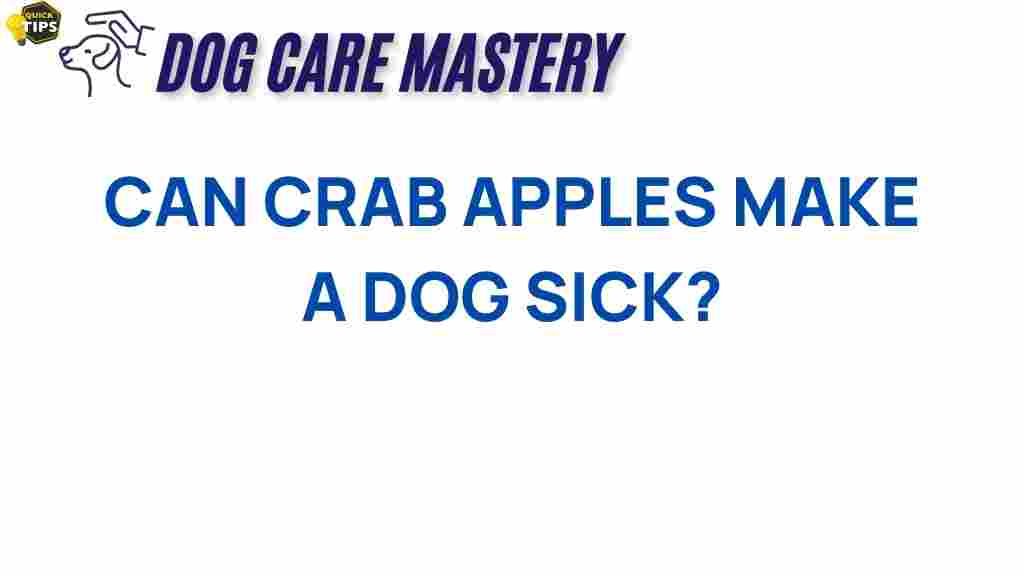The Hidden Dangers of Crab Apples: Can They Make Your Dog Sick?
Crab apples are small, tart fruits that grow on various species of Malus trees. While they might seem innocuous, many dog owners are unaware of the potential risks associated with these fruits. In this article, we will explore the hidden dangers of crab apples and whether they can make your dog sick. Understanding these risks can help you keep your furry friend safe and healthy.
What Are Crab Apples?
Crab apples are smaller varieties of apples, typically measuring less than 2 inches in diameter. They are often used for ornamental purposes in gardens and parks due to their beautiful blooms in spring. While the fruit may be edible for humans, it is crucial to consider how these fruits can affect our pets, particularly dogs.
Why Are Crab Apples Dangerous for Dogs?
Crab apples can pose several health risks to dogs, primarily due to their seeds and the compounds found in the fruit. Here are some reasons why crab apples can be harmful:
- Seeds Contain Cyanide: The seeds of crab apples contain amygdalin, which can release cyanide when ingested. While dogs would need to consume a considerable amount of seeds to be affected, it’s important to monitor their intake.
- Digestive Issues: Eating large quantities of crab apples can lead to gastrointestinal upset in dogs. Symptoms may include vomiting, diarrhea, and abdominal pain.
- Allergic Reactions: Some dogs may have allergic reactions to crab apples, leading to symptoms like itching, swelling, and difficulty breathing.
Signs Your Dog May Be Sick from Crab Apples
If your dog has ingested crab apples, it’s essential to monitor them for any signs of illness. Here are some symptoms to watch for:
- Vomiting
- Diarrhea
- Abdominal pain
- Excessive drooling
- Loss of appetite
- Behavioral changes (e.g., lethargy, agitation)
What to Do If Your Dog Eats Crab Apples
In the event that your dog consumes crab apples, follow these steps to ensure their safety:
- Assess the Situation: Determine how many crab apples your dog has eaten. If they have only consumed a small amount, they may not experience severe symptoms.
- Monitor for Symptoms: Keep a close eye on your dog for any adverse reactions. If they show signs of distress, take action immediately.
- Contact Your Veterinarian: If your dog exhibits any troubling symptoms or has eaten a significant number of crab apples, contact your veterinarian for advice.
- Provide Water: Ensure your dog has access to fresh water to help flush their system.
Preventing Crab Apple Ingestion
Prevention is always better than cure. Here are some effective strategies to prevent your dog from eating crab apples:
- Educate Yourself: Learn to identify crab apple trees and educate your family about their potential dangers.
- Leash Your Dog: When walking in areas where crab apple trees are present, keep your dog on a leash to prevent them from foraging.
- Training: Teach your dog commands like “leave it” or “no” to discourage them from eating potentially harmful fruits.
- Regular Checks: If you have crab apple trees on your property, regularly check for fallen fruit and remove them promptly.
Alternatives to Crab Apples
If you’re looking for safe fruits that your dog can enjoy, consider these alternatives:
- Blueberries: Packed with antioxidants and vitamins, blueberries are a safe and healthy treat for dogs.
- Watermelon: Remove the seeds and rind, and your dog can enjoy a refreshing slice of watermelon.
- Bananas: High in potassium and easy to digest, bananas can be a great snack for your furry friend.
Troubleshooting Tips
If your dog is showing signs of illness after eating crab apples, here are some troubleshooting tips:
- Keep a Calm Environment: Stress can exacerbate symptoms; keep your dog comfortable and relaxed.
- Take Note of Symptoms: Document any symptoms or changes in behavior to provide your veterinarian with detailed information.
- Avoid Home Remedies: Do not attempt to treat your dog with home remedies without consulting a veterinarian first.
When to Seek Veterinary Care
It is critical to know when to seek professional help. You should contact your veterinarian immediately if:
- Your dog has consumed a large quantity of crab apples or seeds.
- You notice severe symptoms like lethargy or difficulty breathing.
- Your dog is experiencing persistent vomiting or diarrhea.
For further information on dog health concerns, you can visit the American Kennel Club’s health resources.
Conclusion
Crab apples may seem like harmless fruits, but they can pose hidden dangers to your canine companions. By understanding the risks associated with crab apples and knowing how to respond if your dog ingests them, you can help ensure their safety. Always err on the side of caution and consult your veterinarian if you have any concerns. Remember, keeping your dog safe is a priority, and being informed is the first step in preventing potential health issues.
For more information on pet safety and health tips, check out our comprehensive guide.
This article is in the category Safety and created by dogcaremastery Team
